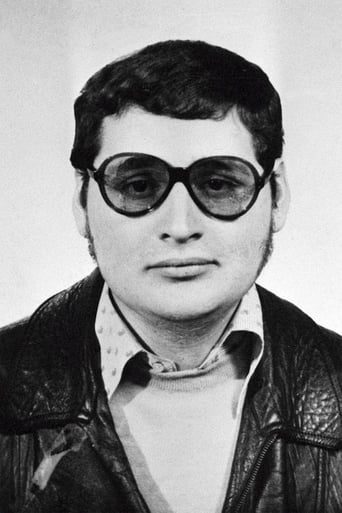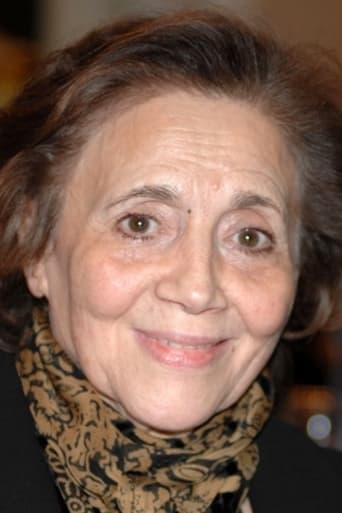SpuffyWeb
Sadly Over-hyped
Smartorhypo
Highly Overrated But Still Good
Curapedi
I cannot think of one single thing that I would change about this film. The acting is incomparable, the directing deft, and the writing poignantly brilliant.
Erica Derrick
By the time the dramatic fireworks start popping off, each one feels earned.
manuel-pestalozzi
After having seen Schroeder's Idi Amin and Kiki the talking gorilla, I was disappointed by L'avocat. From an artistic point of view it is not on the same level. I found it difficult to recognize the organizing, guiding hand of the director. Also, the subject is strangely out of focus – but that is maybe just one of the points the movie wants to make. Maître Vergès must be a pretty elusive fellow and certainly not someone who let himself manipulate by a movie maker. And - contrary to Amin and the gorilla - Vergès is just not very telegenic. That's certainly nobody's fault, it's just a fact.What remains for me are the many „bonmots" this movie contains. It did not become clear to me if Vergès ever was a good lawyer. I suspect he always saw the court of law principally as a stage for making political statements or for furthering a certain self image. But he certainly is a great story teller. „My only war wound", he tells the interviewer, „was self inflicted – I cut a finger when I closed my pocket knife after eating a dish of oysters". „Mao listened to me attentively – or maybe he just wanted to be polite." It is fun to listen to him telling these anecdotes and being disrespectful, even to himself. Many, maybe too many other people make their entrance as interviewees. Even for someone who has a notion of the last few decades of world history it is not always easy to follow.Saying all this, I have to credit the movie for forming a pattern of statements, places and time periods that recount events which brought a lot of pain and sorrow to this planet. The central question - is Maître Vergès a man with a cause? - remains unanswered. Somehow he shifted from one „liberation movement" to the next, maybe connected to secret services, maybe not - his aims apparently as fuzzy as those of the said movements - never drowning like others but always ending up seemingly comfortably on the surface. It is never clear how much Vergès was a prime mover on the terrorist scene or a teleguided pawn. After seeing this movie I would liken him to a joker in a pack of cards.Someone not very deep into history might be surprised at how L'avocat shows that there were always connections and sympathies between old, active Nazis and young, seemingly leftist revolutionaries. Others know the old French saying: Les extrèmes se touchent.
marymorrissey
the film begins with a credit, as stated in other reviews, that it represents the point of view of the director. the material is ambiguous but it seems to me pretty clear that Schroder respects Verges. I disagree strongly with the person who imagines it'd be more "interesting" to watch a doc about lawyers who represent people they despise and wonder what at all would be interesting about that. yes the film leaves some questions unanswered and in the interest of covering more ground on its subject does not get bogged down with some details about the role in history of some of the figures involved. this hardly means that the film was formless, incoherent, but as another reviewer mentioned the film requires the viewer to think, does not hand over conclusions wrapped up in a nice package with a bloody bow on top. It seems indisputable that Verges was a *collaborator* with those of his clients involved in "the struggle" against colonialism, whom he viewed as nothing more or less than soldiers, some honorable and some not so much. He took on the indefensible case of barbie to hold up a mirror to France's record in algeria. I don't really understand peoples' confusion about schroder's point of view of this complicated but far from unfathomable character. I appreciate that this film points the way to other viewing cf the battle of algiers.
mikedaly-1
Terror's Advocate is a must-see for anyone interested in anti-colonialist movements or the politics and terror attacks of Europe in the 1970s and 80s. In many ways, attorney Jacques Verges' tale plays like a who's who of late-20th century international intrigue. Viet Nam, Algeria, Zaire, Cambodia, China, Pol Pot, Yasser Arafat and Carlos the Jackal are but a few of the hot spots and honchos to play a part in the duplicitous attorney's life.As a film, Terror's Advocate is not without its shortcomings. At well over two hours and consisting almost exclusively of interview footage, it is more reminiscent of the documentary style of yesteryear, employing no editing tricks or clever voice-overs that lend appeal to the more modern style of filmmakers like Michael Moore or Morgan Spurlock. From an entertainment standpoint, the film definitely could have benefited from a greater use of file footage as well as better introduction to some of the major players, whose backdrops are often relegated to a single, brief subtitle. A prime example is the mention of the murder of Lumumba, a onetime communist ruler of the freshly independent Belgian Congo. After being overthrown and murdered by CIA directives and an aggressive colonel named Mobutu (who would eventually despotically rule Zaire for over three decades), Lumumba was replaced by Tshombe. Both Lumumba and Tshombe are mentioned in the film without a single reference to Zaire or the Congo. Similarly, little backdrop is created for Carlos. In doing so, the film assumes a lot of knowledge of events from its viewers, probably too much.Nevertheless, Verges is a fascinating character. His path, once pristine, very clearly strays from the light. Modern history generally credits the agenda of the Algerian "terrorists" that expelled the French in 1962. Pontecorvo's Battle of Algiers is a cornerstone of revolutionary anti-colonialist film-making and interestingly is used today as a reference by anti-terrorist government luminaries like Richard Clarke, the onetime anti-terrorist czar and biggest proponent of eliminating Al Qaeda in the presidential administrations prior to the 9/11 attacks. Somewhere along the way, though, Verges lost the faith, for the struggles of the proud Algerians can hardly be compared to the mercenary and ruthless murders committed by Carlos, a Russian/Columbian fighting in the name of Palestinian extremists, but more for his own profit. The former terrorist Stein hilariously refers to Carlos as a psychopath and laments the sad state of Algeria when its leaders later tell him that Hitler was a great man.In many ways, Terror's Advocate leaves more questions than it answers, especially with respect to the attorney's self-imposed 8-year exile, during which he was clearly doing more than just hiding from friends. He also appears to boldly lie to the camera when asked point blank about his connections to Carlos and some of the others (Pol Pot and his people deny Verges was ever even in Cambodia) and thus it becomes difficult to know when to believe him and when not to. It is also clear Verges hubris was ever increasing, as when he takes the Barbie case and faces an army of 40 lawyers for the prosecution (he insinuates that each is only equal to 1/40th of him).The DVD features a time line as a bonus feature. It is definitely worth looking at as it fills in some blanks and adds a little context to the accounts of the interviews.
Max_cinefilo89
In the movies lawyers have often been depicted as honest guys who try to do their best to defend their client, but also as vicious fellas who do the job just for money or fame, even if that implies having dangerous clients (the culmination of such a concept was Taylor Hackford's The Devil's Advocate). And somewhere in between we can put Jacques Vergès, the French attorney around whom Barbet Schroeder has constructed his new film, the documentary Terror's Advocate.The title derives from the case that made Vergès famous at the beginning of his career: he was asked to defend a group of terrorists, responsible for a series of killings in Algeria. Of course, these men and women claimed to be freedom fighters, that what they did was the right thing to do. Vergès shared their ideals, managed to get them all out of jail and even married one of them. Subsequently he was always hired for controversial cases, and always ended up winning, even when his clients were former Nazis or Holocaust deniers.The point of the movie is this: what should people think of Vergès? In fact, the opening caption says: "This film represents the director's personal point of view on Jacques Vergès", yet ironically Schroeder's opinion is not clear. While he seems to agree with the titular lawyer in the first half, saying that the Algerian terrorists had good intentions but used the wrong means (and it is hard not to think likewise, especially after seeing Gillo Pontecorvo's The Battle of Algiers, based on those events), he does not directly express his feelings on Vergès' supposed ties with numerous German terrorists, some of which were involved in the 1972 Olympic Games massacre in Munich.As a consequence, the ambiguous attorney never really comes off as either good or bad: he does seem to have some kind of moral standards (when asked if he would have defended Hitler, he answers: "I'd even defend Bush, but he would have to plead guilty") and claims he has just been doing his job the whole time, but he refuses to comment on his alleged connections with German criminals, spreading no further light on the matter, nor does he reveal exactly what happened during his 12-year "disappearance", which he apparently spent in Paris for purposes unknown.Nonetheless, it shows that Vergès has two essential qualities for a good lawyer: charisma and eloquence. And he knowingly uses those tools while being interviewed, providing valuable insight on a previously unseen side of the legal system and making Terror's Advocate an intriguing picture, although clearly not to everyone's taste.




